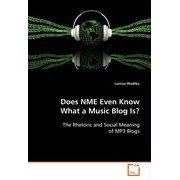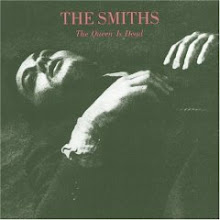
On February 1, 1995, Richey Edwards checked out of the London hotel he was staying at with James Dean Bradfield and effectively disappeared. Two weeks later, Edwards' Vauxhall Cavalier was found abandoned at the Severn View service station, but his body has never been discovered. It's a story that's taken on mythological status, not only among Manics fans, but among music fans in general. Is it because he just vanished? Or because of his self-conscious genius and brilliant creation of the Manics' ethos? Or because he's yet another tale of tragic self-destruction? I think it's a potent combination of all three that elevates him into such a rock star status. Apparently, rock 'n roll is, at its core, a risky lifestyle of testing limits both physically and mentally while pushing creative boundaries at the same time. At least that's the conclusion I come to after reading The Dark Stuff, a book that collects several of Nick Kent's pieces on specific musicians, who are generally considered self-destructive geniuses.
Kent's subjects include Brian Wilson, Jerry Lee Lewis, Syd Barrett, Neil Young, Kurt Cobain, Iggy Pop, Roy Orbison, Prince, and many others. In fact, not all are geniuses, but more in the iconic camp (ie: Sid Vicious). (However, all are male, which may speak to the historical male-domination of rock music or to Kent's own biases - I'm not sure.) Of course Kent's style is a mixture of elevated, verbose descriptions, which evoke both the magical and real, and the down-to-earth criticism you would be capable of if you had lived with these "rock stars" for their daily lives. In his introduction, Kent states that this book should serve as a "warts-and-all celebration of the driving essence that is rock 'n roll," and that it explores the "triumvirate of ego, drug abuse, and self-absorption that preys so relentlessly on the creative mind." And he's right about these three factors and geniuses of any type. What made me start thinking was how interested music fans are in people like this. I know I'm interested because I set aside all other books while reading this one cover to cover in a few nights.
I once read that the reason Sylvia Plath's work was so signifcant, and why the works of other manic-depressives were also significant, was the fact she was able to experience the absolute extremes of human emotion and then describe them aptly. The average person has a much smaller range of human experience - sometimes they're sad and sometimes they're happy, but neither of these poles take hold of them and alter their mental state so totally. Perhaps the reason I (and others) am fascinated with music idols like Iggy Pop, Syd Barrett and even Brian Jones is because I feel like they all might have been mad in one way or another, and madness is one of those anomalies in society that can be taken as either threatening and undesirable or as special and superhuman. The ideas of what madness means has changed over time from rather non-threatening to an abominable deviation to problems with brain chemistry, thus the ways of dealing with madness have shifted from allowing mad people to roam free to incarceration to now some more politically correct incarceration. I'm of the belief that, like Nietzsche's madman, crazy people sometimes have the ability to see beyond what everyone else sees, and that makes them valuable to society. It's no secret that many of the best musicians or songwriters are a little nuts, but at the same time, there are several who are iconic without being particularly talented.
Sid Vicious and Brian Jones come to mind when I think of music icons with no hugely discernible musical talent. In fact, their deaths had no effect whatsoever on their respective bands and came as no surprise to their bandmates or the world. It's like they were the epitome of living fast and dying young, and their personalities and images were so oversized that they became rock martyrs, and subsequently, the subjects of many books and films. This mythology, as Kent notes, can often be linked to the Narcissus myth - these beautiful and charming rock stars know that others admire them, and eventually they can't stop believing in their own singularity and myth nor can they stop destroying their own beauty by their tunnel vision. Being singled out as superhuman or otherworldy can play havoc with self-esteem, whether you deserve the accolades or not. Probably even more so if you don't deserve them.
What I've come to understand through Kent's book and my own observations is that artistic genius seems to go hand-in-hand with some conflicted self-image issues, meaning vanity and ego mixed with insecurity and self-doubt. This superiority/inferiority complex creates a neverending cycle of self-love and self-hate that ultimately causes a seemingly incomprehensible self-destruction: "normal" people can't understand why people who have it all - beauty, talent, success - would want to keep harming themselves and testing their limitations, often perishing in the process. Yet we all watch it like a trainwreck and pore over their life stories like scholars of the doomed. We want to put all of our hopes and insecurities onto one magical person that acts like some totem for the extremities of the human condition - someone who is more than we could ever be, someone who has the ability to tap into something beyond us. We, as humans, love myths and can't stop creating them, and so we continue to do so in the 20th and 21st centuries - these rock stars become our Greek gods and goddesses, Robin Hoods, and Gilgameshes. Their stories become both legend and parable.
Unlike the subjects of Nick Kent's book, no one knows what happened to Richey Edwards - he didn't overdose and die, he didn't blow his face off with a shotgun, he didn't take too much acid and end up languishing in his mother's house, he didn't live through trial after trial to a ripe old age of self-reflection and redemption, nor did he continue on making art, mediocre and sometimes brilliant, until a natural death. He just went missing. In many ways, he trumps them all because his genius even manifests itself in his exit. Without a body, Richey Edwards becomes both immortal and incorruptible. And like King Arthur and so many other messianic figures, he always has that potential of returning when his followers need him most.
Self-disgust is self-obsession, honey, and I do as I please. - Faster, Manic Street Preachers
Such beautiful dignity in self-abuse. - 4st 7lb, Manic Street Preachers
Paint It Black - The Rolling Stones
Archives of Pain - Manic Street Preachers





















































2 comments:
Thanks.
Smashing writing. As someone who takes the 'Black Dog' for a walk occasionally, I can empathise with all this.
Beautiful and brilliant! What a pleasure to read your writing! Thanks for the tip about the book, I ordered it immediately and I'm sure I'll enjoy it :)
Post a Comment